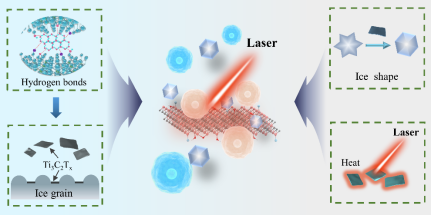A research team led by Prof. ZHAO Gang from the University of Science and Technology of China (USTC) of the Chinese Academy of Sciences, collaborating with Prof. LIU Huilan from the First Affiliated Hospital of USTC, has achieved high-performance cryopreservation of living cells using synergetic ice inhibition effects of two-dimensional (2D) titanium carbide (Ti3C2Tx) MXene nanosheet.
This achievement expands the application of efficient cryopreservation based on physical fields. Relevant results were published in ACS Nano. Ice formation, growth, and injury are one of the main challenges for successful cryopreservation of cells, tissues, organs, and biocomposites like living cell constructs and cultures. A deep understanding of ice crystal formation and the development of effective methods or materials to control ice formation and growth has a profound influence on fundamental research and practical applications.
Functional nanomaterials have become a research hotspot of ice inhibition materials. However, most studies only focus on the molecular ice suppression effect of nanomaterials. Studies of synergetic ice inhibition effects, such as combination with photothermal or magnetothermal effects, are still rare.
In view of this, the researchers investigated synergetic ice suppression effects of 2D Ti3C2Tx MXene nanosheets, including their regulating function of ice crystals morphology, growth, and thawing.
According to the researchers, in the cooling process, Ti3C2Tx can inhibit the sharp edge morphology of ice crystals and reduce direct damage. In the thawing stage, the high-efficiency photothermal conversion property of Ti3C2Tx facilitates rapid ice melting, thus reducing the devitrification and ice recrystallization.
High-performance cryopreservation of stem-cell-laden hydrogel constructs was realized with the use of synergistic ice-suppressing effect of this 2D MXene nanosheets.
Synergetic ice inhibition effects of two-dimensional Ti3C2Tx MXene nanosheet. (Image by CAO Yuan et al.)





